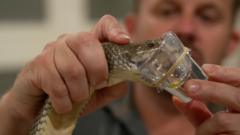A remarkable study reveals the potential for a universal antivenom, harnessed from Tim Friede’s unique immune response after enduring over 200 snake bites and thousands of venom injections.
**Pioneering Antivenom Developed from Man's Unique Immune Response**

**Pioneering Antivenom Developed from Man's Unique Immune Response**
Groundbreaking research unveils universal snake antivenom derived from a man’s deliberate exposure to snake venom over two decades.
In an extraordinary breakthrough in medical research, scientists have developed a groundbreaking antivenom using the blood of Tim Friede, a U.S. man who has voluntarily exposed himself to snake venom for nearly 20 years. This innovative antivenom has shown "unparalleled" success, providing protection against lethal doses of venom from numerous snake species during animal tests.
Mr. Friede's unique approach involved subjecting himself to more than 200 bites and administering over 700 venom injections, which he meticulously recorded on his YouTube channel. His original intention was to build personal immunity while showing off his snake-handling skills. However, after suffering severe consequences from a dual cobra bite that left him in a coma, Friede recalibrated his objectives.
Dedicated to finding better snakebite therapies, he explained his motivation: “It just became a lifestyle… for people 8,000 miles away who die from snakebite.” Current antivenom treatments often rely on matching specific snake venoms, but now researchers are exploring broadly neutralizing antibodies that could address this limitation.
In collaboration with Dr. Jacob Glanville from Centivax, the team identified these antibodies within Friede's blood, leading to the development of a novel antivenom cocktail targeting neurotoxins primarily used by elapid snakes like cobras and mambas. Testing on mice showed that the antivenom cocktail protected against up to 13 of 19 targeted venomous snakes, demonstrating enormous potential for saving countless lives.
As research continues, efforts will focus on refining the antivenom further, potentially expanding its efficacy to cover a broader spectrum of snake venoms, including those from vipers. Prominent researchers in the field believe that the methodologies used here could pave the way for universal antivenoms against various snake families within the next decade.
While this promising development is still in its preliminary stages, the scientific community is optimistic, acknowledging that further research and extensive testing are necessary before any practical application can occur. For Friede, witnessing the impactful outcome of his sacrifices culminates in a sense of fulfillment, as he reflects on the potential lifesaving capabilities of his unique journey.
Mr. Friede's unique approach involved subjecting himself to more than 200 bites and administering over 700 venom injections, which he meticulously recorded on his YouTube channel. His original intention was to build personal immunity while showing off his snake-handling skills. However, after suffering severe consequences from a dual cobra bite that left him in a coma, Friede recalibrated his objectives.
Dedicated to finding better snakebite therapies, he explained his motivation: “It just became a lifestyle… for people 8,000 miles away who die from snakebite.” Current antivenom treatments often rely on matching specific snake venoms, but now researchers are exploring broadly neutralizing antibodies that could address this limitation.
In collaboration with Dr. Jacob Glanville from Centivax, the team identified these antibodies within Friede's blood, leading to the development of a novel antivenom cocktail targeting neurotoxins primarily used by elapid snakes like cobras and mambas. Testing on mice showed that the antivenom cocktail protected against up to 13 of 19 targeted venomous snakes, demonstrating enormous potential for saving countless lives.
As research continues, efforts will focus on refining the antivenom further, potentially expanding its efficacy to cover a broader spectrum of snake venoms, including those from vipers. Prominent researchers in the field believe that the methodologies used here could pave the way for universal antivenoms against various snake families within the next decade.
While this promising development is still in its preliminary stages, the scientific community is optimistic, acknowledging that further research and extensive testing are necessary before any practical application can occur. For Friede, witnessing the impactful outcome of his sacrifices culminates in a sense of fulfillment, as he reflects on the potential lifesaving capabilities of his unique journey.







